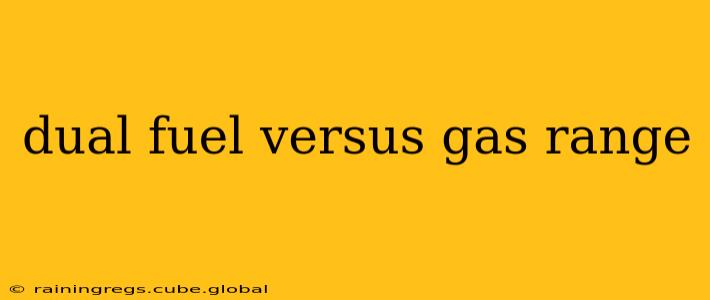Choosing between a dual fuel and a gas range can feel overwhelming. Both offer distinct advantages, and the best choice depends entirely on your cooking style and preferences. This comprehensive guide will break down the key differences, helping you make an informed decision for your kitchen.
What is a Dual Fuel Range?
A dual fuel range combines the best of both worlds: a gas cooktop and an electric oven. The gas burners offer precise, immediate heat control that many chefs prefer, while the electric oven provides even heating and consistent temperatures, ideal for baking and roasting.
What is a Gas Range?
A gas range, as the name suggests, uses gas for both the cooktop and the oven. This offers a unified cooking experience, often appreciated for its consistent feel and familiar operation.
Dual Fuel vs. Gas Range: Key Differences
Here's a head-to-head comparison highlighting the major distinctions:
| Feature | Dual Fuel Range | Gas Range |
|---|---|---|
| Cooktop | Gas burners | Gas burners |
| Oven | Electric oven | Gas oven |
| Heat Control | Precise gas cooktop, even electric oven | Consistent gas throughout |
| Baking | Excellent, thanks to even electric heat | Can be inconsistent, requiring adjustment |
| Cleaning | Easier to clean oven (usually self-cleaning) | Can be more challenging to clean |
| Energy Efficiency | Generally more energy-efficient oven | Can be less energy-efficient overall |
| Cost | Typically more expensive | Generally less expensive |
What are the pros and cons of a dual fuel range?
Pros:
- Precise Gas Cooktop: Offers superior control over heat, crucial for delicate cooking techniques.
- Even Electric Oven: Ensures consistent baking and roasting results.
- Easier Oven Cleaning: Electric ovens often feature self-cleaning cycles.
Cons:
- Higher Initial Cost: Dual fuel ranges are generally more expensive than gas ranges.
- Requires Two Energy Sources: Needs both gas and electricity hookups.
What are the pros and cons of a gas range?
Pros:
- Lower Initial Cost: Gas ranges are typically more affordable.
- Consistent Fuel Source: Uses gas for both cooktop and oven, simplifying operation.
- Faster Heating: Gas burners generally heat up quicker than electric.
Cons:
- Inconsistent Oven Temperatures: Gas ovens can be prone to uneven heating, especially older models.
- More Difficult Oven Cleaning: Cleaning gas ovens can be more time-consuming.
- Less Energy-Efficient Oven (Generally): Gas ovens may use more energy compared to electric ovens.
Which type of range is better for baking?
For baking, a dual fuel range with its electric oven is generally preferred. The even heat distribution in an electric oven leads to more consistent baking results and less risk of hot spots.
Which type of range is better for cooking?
Both offer excellent gas cooktops. The choice depends on personal preference. Some prefer the immediate response and precise control of gas burners, regardless of oven type.
Which type of range is more energy efficient?
Generally, a dual fuel range tends to be more energy efficient in terms of the oven. Electric ovens typically use less energy than gas ovens. However, the overall energy efficiency depends on various factors, including usage patterns and appliance efficiency ratings.
Which type of range is easier to clean?
Electric ovens in dual fuel ranges usually have self-cleaning cycles, making cleaning significantly easier. Gas oven cleaning requires more manual effort.
Which is more expensive: dual fuel or gas range?
Dual fuel ranges are typically more expensive than comparable gas ranges due to the combined gas and electric components.
By carefully considering your cooking habits and priorities, you can confidently choose the range that best suits your needs and budget. Whether you prioritize precision and even baking or prefer a consistent, cost-effective solution, understanding the nuances of dual fuel and gas ranges will empower you to make the right choice for your kitchen.
